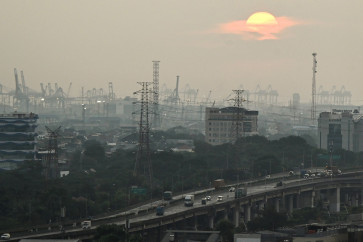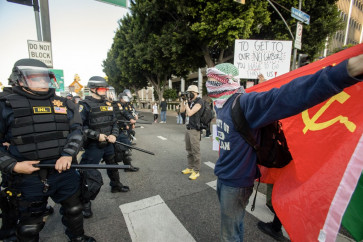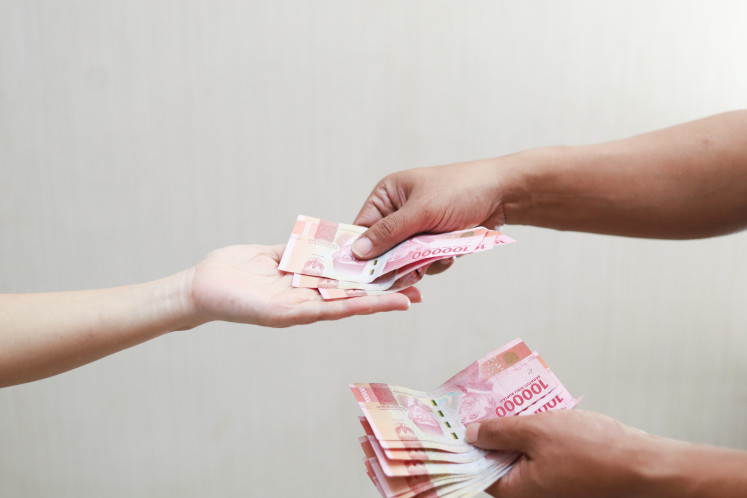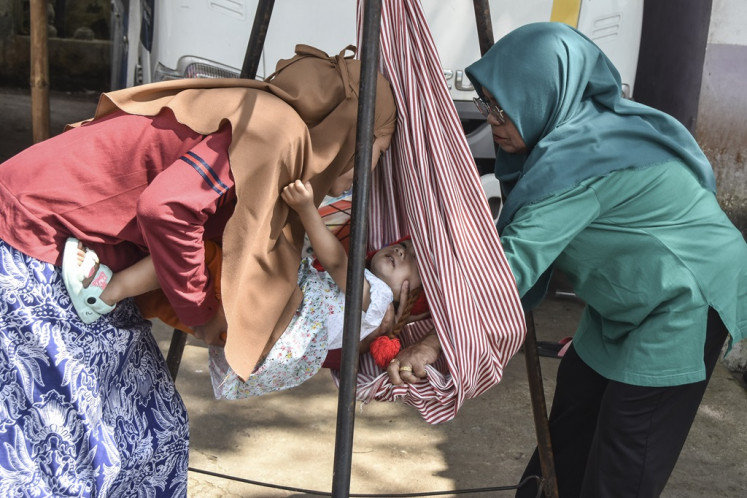Phone makers urge govt to drop its planned 20% tax
Vulnerable to smuggling: Consumers sit in front of cell phone counters at a shopping center in Jakarta on Thursday
Change text size
Gift Premium Articles
to Anyone
 Vulnerable to smuggling: Consumers sit in front of cell phone counters at a shopping center in Jakarta on Thursday. The trade and industry ministries plan to impose 20 percent luxury tax on cell phones to spur growth in the infant domestic industry. The policy may result in a higher number of smuggled cell phones, says the Indonesia Cellular Phone Association (APSI). (JP/Nurhayati) (APSI). (JP/Nurhayati)
Vulnerable to smuggling: Consumers sit in front of cell phone counters at a shopping center in Jakarta on Thursday. The trade and industry ministries plan to impose 20 percent luxury tax on cell phones to spur growth in the infant domestic industry. The policy may result in a higher number of smuggled cell phones, says the Indonesia Cellular Phone Association (APSI). (JP/Nurhayati) (APSI). (JP/Nurhayati)
V
span class="caption" style="width: 498px;">Vulnerable to smuggling: Consumers sit in front of cell phone counters at a shopping center in Jakarta on Thursday. The trade and industry ministries plan to impose 20 percent luxury tax on cell phones to spur growth in the infant domestic industry. The policy may result in a higher number of smuggled cell phones, says the Indonesia Cellular Phone Association (APSI). (JP/Nurhayati)
Cellular phone manufacturers have urged the government to scrap its plans to introduce a 20 percent sales tax over concerns that such a policy may cause a surge of illegal imports.
The government is planning to impose a 20 percent luxury goods sales tax on almost all types of cell phones in an attempt to develop the domestic cell phone industry.
Hasan Aula, chairman of the Indonesian Cellular Phone Association (APSI), which represents cell phone manufacturers and distributors, said the tax would immediately result in higher phone prices, as vendors would directly pass on the costs incurred by the tax to their buyers.
'A significant price gap between legally imported phones and illegally imported ones will inevitably stimulate the growth of a black market,' Hasan said during a press conference.
The number of cell phones sold on the black market could jump from the current figure of between 20 and 30 percent of national sales to 50 percent, he added.
That would be a major blow to total cell phone sales, which amounted to 55 million phones last year, reaping revenue of US$4 billion.
According to Hasan, if the government opted to go ahead with its plan, a reasonable option would be to apply tax of between 5 and 10 percent on cell phones selling for more that Rp 5 million ($440.24). But any move should be followed by tight controls on cell phones circulating in the country through the International Mobile Equipment Identity (IMEI) numbers in every device, he added.
The government planned last year to allow telecom operators to curb the circulation of illegally imported cell phones through the use of the IMEI, an identification code unique to each handset.
Cell phones with unregistered identification numbers cannot operate within the country as the operators block network access. However, the proposal did not move ahead due to technical difficulties.
Under a new rule that became effective early last year, the importation of cellular phones, including smartphones and handhelds, including personal digital assistants (PDA) and computer tablets, can only be carried out by registered importers with special licenses from the Trade Ministry.
The rule also allows the government to keep a database of all the IMEI numbers of each device shipped into the country.
Usun Pringgodigdo, the head of APSI's technology division, criticized the 'tax policy', saying it would be ineffective in helping to foster growth in the local cell phone industry. Instead of imposing a tax on cell phones, he said, the government should combat illegal imports, which discouraged investors from establishing manufacturing facilities in the country.
'Cell phone producers fear that they cannot compete with phones sold on the black market, which cost less than legally imported phones. By eradicating the black market, we can provide a more conducive business climate,' he said.
Usun added that the use of IMEI numbers to activate cell phones would be the most effective way to curb the illegal trade in gadgets, as had been proven in other countries, such as India.
The Taiwan-based Foxconn Technology Group, which says it plans to invest in a manufacturing facility in Indonesia, previously raised its concerns over the high number of illegal handsets, which would hurt its sales.









